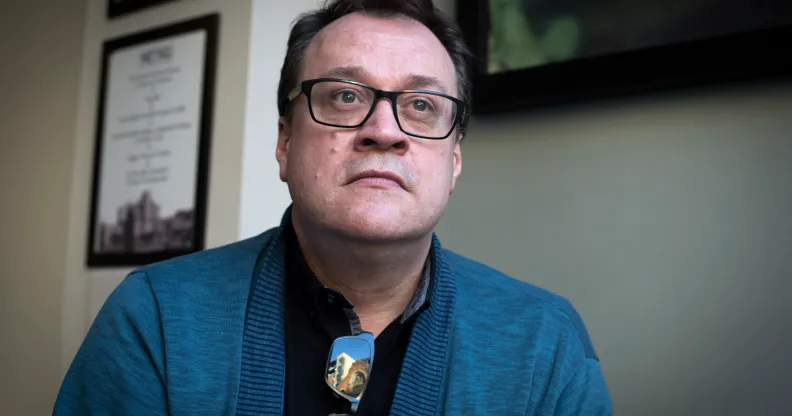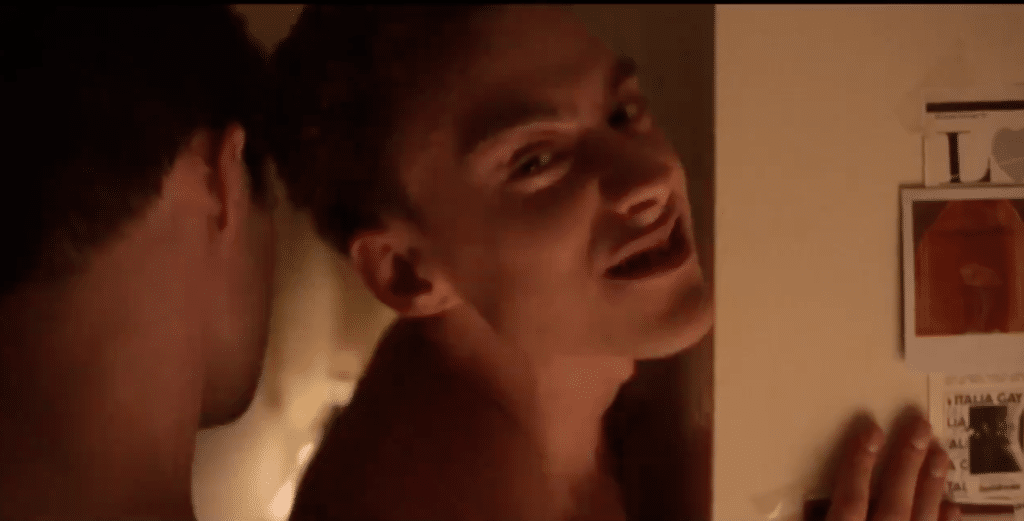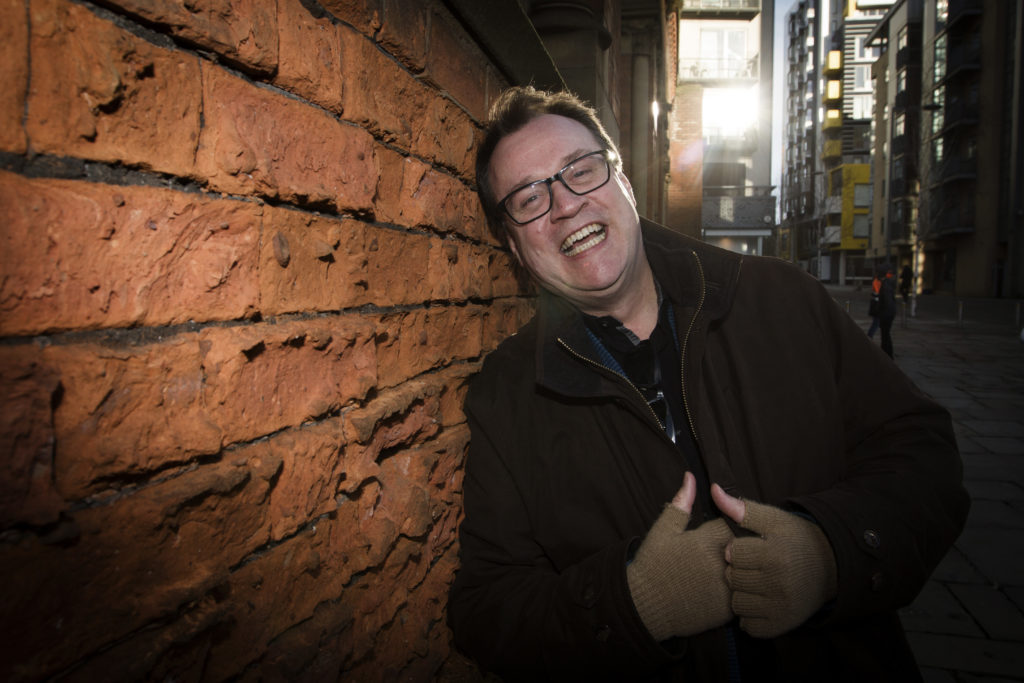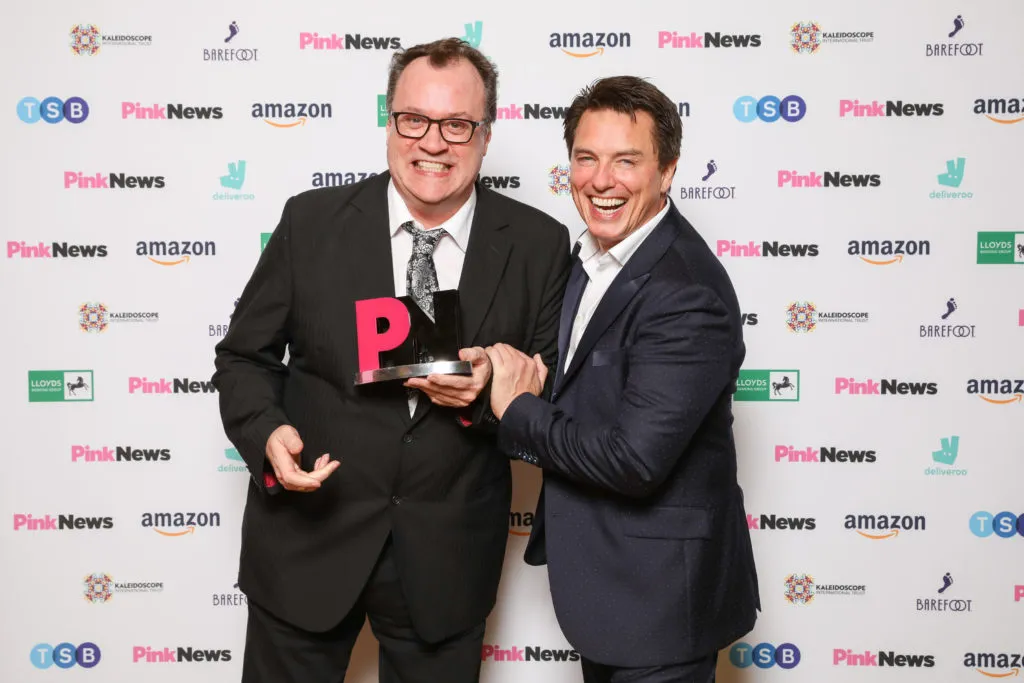It’s a Sin creator Russell T Davies on queer actors playing straight, gay Tories, TV erections and spunk

British television screenwriter and director Russell T Davies. (Getty/Colin McPherson)
British television screenwriter and director Russell T Davies. (Getty/Colin McPherson)
Russell T Davies, the writer, showrunner, Instagram influencer and all-round televisual powerhouse is – you can’t have failed to notice – back with It’s a Sin.
The Doctor Who revivalist and creator of Queer as Folk and Cucumber returns to Channel 4 with his long-awaited new drama. And while it depicts queer culture in the shadow of the HIV/AIDS pandemic of the 1980’s, it’s also a celebration of life and love as much as it is about loss. Your heart will swell with pride, before being broken into pieces. Come on, it’s Russell T Davies – did you expect anything else?
PinkNews: One thing that’s been noted quite extensively recently – the lead cast of It’s a Sin are all out, queer actors.
Russell T Davies: Yes! Marvellously – legally – you’re not allowed to ask whether an actor’s gay, which is a very fine thing. But they are, because that’s where I am right now, in my life. I haven’t always been. We live in time. If you’d interviewed me 10 years ago I’d have said different things. And I hope I’ve learned, I hope I’ve listened to people.
Right now I absolutely believe in casting gay as gay. Absolutely. There’s quite a few people in there, gay actors, in straight parts as well. Lovely. And I do believe in that profoundly. Because I think if you’re casting someone, you want an actor who can portray falling in love, or being duplicitous or being evil, or being a drug runner or being a saint, or being ill, or being a bad son or a good son. That’s what they’re there to portray. They’re not there to act gay. Gay is not a performance. I don’t think gay is performative. I am not a bunch of performance codes. I really, really think now – I genuinely think – that casting gay as gay now is the right thing to do.
Gay is not a performance. I don’t think gay is performative. I genuinely think that casting gay as gay now is the right thing to do.
I also believe in casting gay as straight. And I’ll tell you why! [Chuckles] Because from the age of eight, we are pretending to be straight. It’s the first thing we learn to do. Before we learn to f**k, we learn to fake. Oh, that’s a good phrase, please print that. Before we learn to fuck, we learn to fake.
And literally as a child from 11-years-old having your first sexual thought – even today in 2021 – you’re burying it, you’re hiding it and you’re fitting in with the straight people.
So I want someone to come and play straight. I will choose someone who’s been studying straightness ever since their first instincts were formed. So yes, gay as straight is fine.
Cucumber exists within the Queer as Folk universe – what about It’s a Sin in the RTDU?
My gayverse! The RTDverse! The D-Verse?
You were doing it before anyone else with Doctor Who.
I f**king was! Please, someone, do it again. We didn’t just do it, we delivered on it. It was enormous!
So Queer as Folk…
Yes! They’re in the same world. Yes, yes, yes. I honestly believe. I literally remember sitting there thinking, ‘Should I have a young nurse called Hazel, or someone’s had a son in Ireland called Stuart.’ And I kind of played with that for a while and then thought, that’s just writing for me and not for anyone else. But I do believe these characters could hop on a bus, go up to Manchester and be in a fledgling Canal Street and walk down the same paths. I think they’re all in the same world. I think a Dalek could come in. Well, actually it does! I have this strange notion that everything I write is in the same world.
You do have a similar opening sex scene in It’s a Sin as you do with Queer as Folk…
Yeah! [Laughs] It ends slightly differently…

Russell T Davies returns with It’s a Sin, starring Olly Alexander. (Channel 4)
Were you able to be more adventurous – I don’t want to say explicit– with depictions of sex, given times have changed since 1999…
Not particularly explicit. There’s always a limit on how explicit you can get. The fact that you can’t show an erection genuinely censors every sex scene ever made in the history of film and cinema. It’s fake from that moment onwards.
However, I did think it was important this time – and I haven’t properly written ‘proper’ sex scenes since Queer as Folk. In some ways I had to for this, because actually, this is about the transmission of a virus through sexual intercourse. This drama is actually about fluids, it’s about viruses, it’s about spunk. It’s about the transmission of that.
The fact that you can’t show an erection genuinely censors every sex scene ever made in the history of film and cinema.
I remember writing episode one thinking, ‘Actually, I’ve got to be in there, in the bedroom.’ And then in episode three, I loved writing that scene which is the pivotal sex scene between Donald Bassett and Ritchie. Which actually isn’t graphic at all, but their dialogue about f**king and the need to f**k and f**king with condoms is exactly the conversation that happened in 10 million bedrooms, still happens to this day. I thought, in order to reach that scene, I had to make sex part of the equation right from the very beginning.
And also it’s a drama about coming out, about being young and discovering yourself. There’s quite an extended sex sequence during episode one of Ritchie with lots of different lovers. I know some people will watch that and think, ‘Ooh, it’s just sex.’ In every sex scene he’s doing a different form of sex and he’s learning something new in that sequence, that is him growing up on screen it’s not just nakedness, there’s a learning process there.
Were you on set for that one?
No! FAR too embarrassed. Also banned. [Laughs] I was there for the Queer as Folk sex scenes and it’s just embarrassing as the writer, you feel like a pornographer.
How was Olly Alexander with all of that side of acting?
Oh, a more open-minded and open-hearted actor you couldn’t wish to have. And now of course, as you know, all dramas have intimacy coordinators, which is an astonishing breakthrough. The fact we didn’t use those in days gone by is simply laughable. It’s as if we did stunts without stuntmen – you’d have dead actors!
The fact that we’d just blunder into sex scenes on our own is astonishing. Now you have someone there, the intimacy thing is properly planned into the rehearsal process. They talk to the actors and what they want, they look at what the script wants and what the actor is comfortable with. It’s really properly professionally done. It’s taken a lot of worry and fear out of the whole climate of being on set, it’s a brilliant thing. Really brilliant.
And what do you use to make spunk on TV in 2021?
Yeah, what is that? I don’t know. I think it’s probably some form of shampoo. Imagine the rushes for that! ‘No. No. No.’ Very much like a real sex life, actually. [Laughs] The amount of times it went wrong! That’s the most accurate I’ve ever been. ‘No, do it again!’ [Laughs].
Ritchie’s a gay Tory…
Yeah, yes, yes.

British television screenwriter and director – and It’s a Sin creator – Russell T Davies pictured in Manchester, 2016 (Colin McPherson/Corbis/ Getty)
Is it fair to say there’s self-loathing there, in part?
Maybe. I also think – I genuinely think – there’s a lack of right-wing characters on screen. Genuinely. Things tend to be made, written and produced by left-wing people, mostly because we’re brilliant and the right-wing aren’t. But here we are in a country with an 80 MP majority for a quite an extreme right-wing party. I think you often kind of wise up. I didn’t just do it for self-loathing, I did it for genuine balance.
And also it’s a proper representation of the time. History tends to get written by the activists and it would be wrong if I represented all gay men, saying that that book, Jenny Lives with Eric and Martin [1981 children’s book that was one of the first to discuss homosexuality] – they talk about it in episode four – it would be wrong to say that every gay man was on the side of that book.
Things tend to be made by left-wing people, mostly because we’re brilliant and the right-wing aren’t.
I remember it very clearly the time, a lot of people thinking, ‘No, that’s wrong, you don’t need to teach children’ – gay people saying you don’t need to teach children about that, fearing that children were being brought into the gay debate. That always sets alarm bells ringing, when childhood is mistakenly confused with sexual impulses in the eyes of straight people. So there were a lot of people – a lot of gay people – saying that book shouldn’t exist. So I genuinely wanted to represent that.
It looks like Ritchie’s wrong, but I didn’t intend that. It looks like Ritchie’s wrong because we’re left-wing people. But that’s not the intention, the intention was to genuinely have a right-wing voice in there. Look at him – mother and father, they’re all ex-hippies on the Isle of Wight. Hippies who grew up and got houses and went from left-wing to right wing. It’s very true of islands, certainly true of the Isle of Man. It’s very accurate. It’s absolutely accurate.
You wrote a lovely piece in the Observer about how you had ‘avoided’ talking about HIV and AIDS?
Yeah! As most of us do. There’s a scene in another version of this – God, I can’t believe I never wrote this – because this happened to a friend of mine. He was sitting with a bunch of friends in the pub, and they were about to go on a march. They were AIDS activists, they had all their leaflets, they had placards. And a gay man walked up to them and said, ‘I’m sick and tired of you lot, I don’t know anyone who’s died of AIDS, I don’t know anyone who’s HIV positive, and I’m fed up with being represented by you.’ And off he stormed.
And that man meant it, it’s true. I’m seeing a lot of voices online saying it’s the lost generation, the lost generation of gay men. It wasn’t the entire generation, there’s an awful lot of us still alive, the vast majority of us are still alive. That’s a very sympathetic thing to say, I appreciate it. But actually, I think when it comes to this topic, the name of the game these days is accuracy. You’ve got to be accurate in what you’re saying. And that’s not true, that a generation was gone.
So yes, there’s a kind of natural avoidance to it. I think I’ve probably written it better now than I would have written it in 1991. I wonder what I would have written? I’m certainly a better writer. I do feel like, to tackle this, I needed all my tricks, all my skills, as in all my talent. Whatever talent that is, I needed it all to keep this true and to keep it interesting, to keep it lively and to do it justice.

Olly Alexaner in Russell T Davies’ new AIDS drama It’s a Sin. (Channel 4)
You’ve previously mentioned Olly Alexander knowing his stuff when it came to HIV. There’s often a misguided assumption about a ‘younger generation’ not being as educated.
Or anyone. I mean, it’s easy for us to blame the young, but you know even now you can sit down with a bunch of middle-aged gay people and say, ‘If someone with HIV sneezes in the room, are you safe?’ And you get some very different answers. And actually you get a lot of ignorance, a lot of people simply not knowing. It’s medicine, it’s illness, it’s something that none of us want to look at all the time.
So I think it’s wrong to blame young people for it. And indeed, young people are now being born into a world where the antiretroviral medicines exist, where it’s not a lifetime defining condition, or certainly not a life-ending condition. That’s not quite true. No one should ever want to be taking drugs for the rest of their life. No one should ever shrug and say, ‘Yeah, it’s fine, I’ll take the drugs.’ At our age, we know it’s better not to go on medicine than to be on medicine. But that’s every generation.
Every generation blunders on from the last one. It’s not the role of life for young people to sit there looking back. Of course they don’t, they’re young. They’re looking forward. So it’s one of those things you’ve got to be easy about. Because you will also find young people, like Olly terribly committed to the cause. And very wised up and boned up on the whole thing. But don’t blame those who are not looking back. Are we sitting having a little conversation about Harold Wilson in the 60s? No, we’re not. Move on! I’m thinking about what I’m having for my tea tonight. Everyone looks forward all the time.
Representation in drama – particularly queer representation – always causes debate. What are you anticipating in reaction to It’s a Sin?
I’m very much aware that people are furious about AIDS to this day, rightly so, and that fury always provokes a reaction. So I absolutely know there’ll be voices saying, ‘What about the straight people who died of AIDS? What about the women who died of AIDS or children who died of AIDS? What about other sorts of gay men who died of AIDS? What about those in their 60s? What about this sort of person? What about that sort of person?’ I know that will happen.
I’ve never paid great attention to that. Because I know that thinking about representation cropped up in Queer as Folk. It actually pops up in Doctor Who – how many fans with an opinion were there in 2005 as to how that show should exist? And I’ve learned I simply have to be responsible to the story and to tell it well. If you tried to be responsible to everyone, you’d be responsible to no one. And also it’s not how fiction works.
I’ve never been on a Yorkshire Moor crying over my lover, but I still like Wuthering Heights. I’ve never got a DeLorean to travel at 88 miles an hour, but I love Back to the Future. It’s not what fiction does. When fiction’s good and true it appeals to anyone, anywhere. That’s how it works.

It’s a Sin: Russell T Davies and John Barrowman at the 2019 PinkNews Awards
I always ask you this question, or a variation on it…
Who’s gay?
No, you always ask me that. These days it seems like everyone is!
See, I never thought that Phillip Schofield was gay. I was like a right chump. There’s a line in It’s a Sin about Phillip Schofield being gay that had to run past lawyers. But because we all thought he was straight, I now look – he’s a very nice man, Phillip Schofield. He’s always been very nice to me – I look a little bit like I’m taking potshots at him now.
Whereas actually, when that was written and filmed we’d all presumed he was so straight that that line was no offence, because I was attacking gay men who always presume that the handsome man on television is gay. We do run these things past lawyers and the lawyers went, ‘No, you don’t need to tell him, because he’s straight.’ Look. Isn’t that amazing!
On that note, the question was where are we now with queer representation on television? How are you feeling about it all?
Oh, interesting. Very interesting. I’m fascinated by – going back to the old ‘casting gay as gay thing’, which is one of my favourite things. I’ve always maintained that the soaps are great outliers, in terms of casting gay as gay. They were the first people casting Anthony Cotton as gay in Coronation Street. That was a very big move.
My friend Tony Wood did that in 2003. Tony literally said to me that he’s basing Eileen’s house on Hazel’s house in Queer as Folk. He wanted a house full of misfits and waifs and strays, including gay people. And that’s what he did, and Eileen’s house is still there as that.
Now there’s this big swing-around coming where suddenly there’s a new Todd and he’s there played by a straight boy. I wonder if the soaps are kind of indicating where we’re going now, that the casting of gay as gay doesn’t matter? They seem to be casting straight people as gay people now. Is it a step back or is that a step forward? I’m kind of very interested in that.
Soaps seem to be casting straight people as gay people now. Is it a step back or is that a step forward?
But mainly I think television’s very current. It’s one of our four fastest art forms. It’s one of our quickest forms of expression. I think there’s a great freedom now. From the Royal Exchange Theatre I know a young actor called Gabriel Clark who’s just gone into Hollyoaks playing a straight boy, Ollie, and he is gay. He came out as gay online on Instagram and no one blinked. You have to think that’s a brave new world, that’s a better new world. Things are really getting better in that sense when Gabriel can do that. He’s a lovely actor.
I say this, you take the soaps out of the equation, you can still trawl through an awful lot of nine o’clock dramas in which there’s not even a glimpse of a lesbian’s ankle. And I do look at them. I look at the billings, I study this stuff. It’s my one area of expertise in life, is television.
I’m not saying that things have to have a lead gay character, but I do watch those things thinking – the thrillers, they’re very often thrillers – they always seem to be straight somehow. You watch a thriller going, ‘Where is the lesbian sister? Where is the gay dad? Where’s the gay son? Where’s the trans son? Why, as part of the picture of life, why haven’t you done that?’ I then do that in my job. This is why the Years and Years family were a perfect picture of that and I get taken the piss out of. I just look like I’m ticking some representative boxes.
So it’s the usual battles. The same old battles go on. None of those arguments stop me doing anything. And all good writers will keep doing that.
Russell T Davies’ It’s a Sin is on Channel 4, Fridays at 9pm and streaming on All 4.

